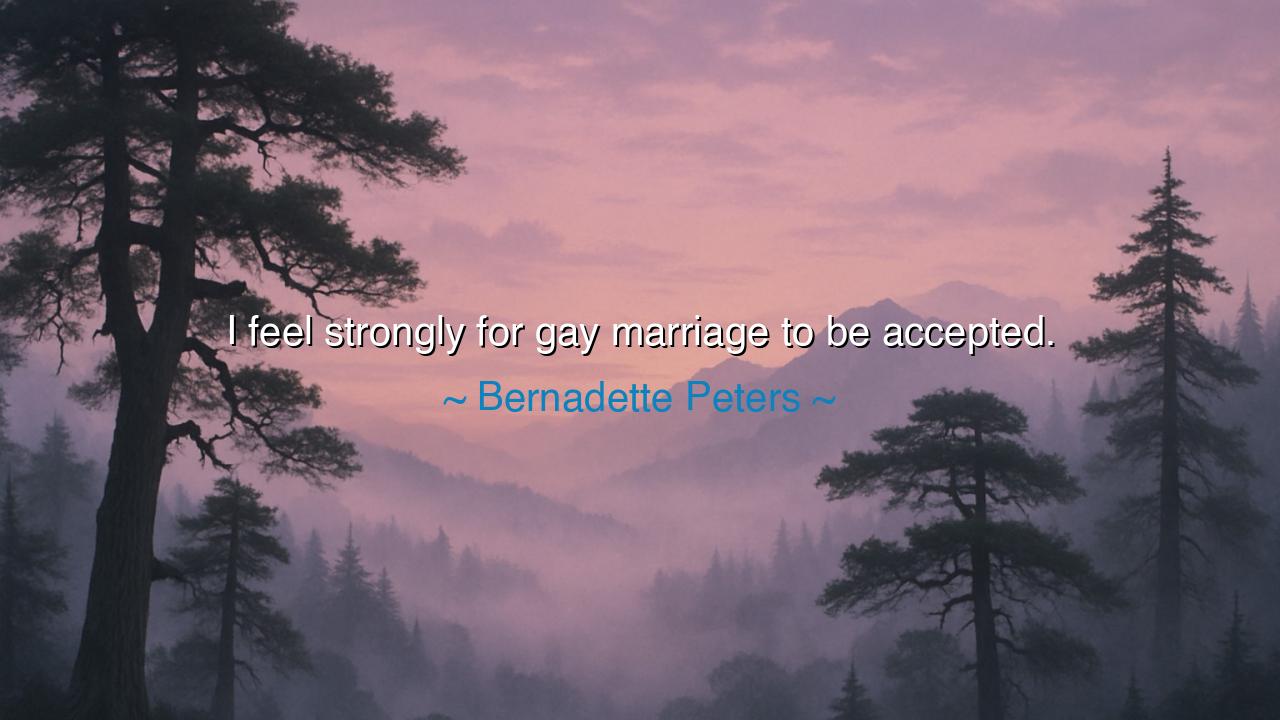
I feel strongly for gay marriage to be accepted.






"I feel strongly for gay marriage to be accepted." With these words, Bernadette Peters speaks from a place of compassion, empathy, and moral clarity, expressing a desire for justice and equality for those whose love has been marginalized for far too long. Peters’ statement is not merely a declaration of belief, but a call to action, urging society to embrace the full recognition of love in all its forms. The essence of her words touches on a fundamental truth: love—in any of its many expressions—should not be bound by the constraints of society's outdated norms, but celebrated for its purity, power, and ability to unite individuals across the divides of race, gender, and sexual orientation.
In the ancient world, the concept of marriage was often more about the union of families and the consolidation of power than the connection of souls. The Greeks viewed marriage as a social contract that secured the structure of society, with little regard for the romantic or emotional aspect of the union. The philosopher Aristotle described marriage as a natural part of life’s progression, but his writings reflected the limitations of the time—women were largely seen as property, and same-sex relationships were treated with varying degrees of acceptance depending on the cultural context. In Athens, for example, while male homosexual relationships were often idealized in their youth, they were not seen as legitimate expressions of love or commitment in the way that heterosexual unions were.
Bernadette Peters, however, lives in an era where the ideals of justice and equality are at the forefront of societal progress. Her advocacy for gay marriage is part of the long march toward recognizing that love is not limited to the traditional confines of heterosexuality. The 20th and 21st centuries have witnessed a revolution in the recognition of love’s many forms. Consider the Stonewall Riots of 1969, which became a catalyst for the modern LGBTQ+ rights movement. The bravery of those who stood up in the face of oppression—fighting not just for gay marriage, but for the right to love freely—became the foundation for a battle that would continue for decades. In 2015, the Supreme Court of the United States ruled in favor of same-sex marriage, a victory that Bernadette Peters and so many others longed for and fought to see realized.
Just as Dr. Martin Luther King Jr. once stated, "Injustice anywhere is a threat to justice everywhere," the fight for gay marriage is part of the ongoing battle for human dignity. The struggle for the right to marry is not just a legal issue, but a human rights issue—an acknowledgment that the love between two people, regardless of their sex, is as worthy of recognition and respect as any other. The fight for gay marriage reflects the universal human desire to love and be loved, and to have that love recognized by society. It is a call for acceptance, not just of the relationship, but of the human beings who form it.
Bernadette Peters’ impassioned plea for gay marriage to be accepted echoes the voices of countless advocates, activists, and individuals who have fought for their right to love openly and without fear. Their courage and commitment have reshaped the cultural landscape, allowing those who once hid in the shadows of societal rejection to step into the light of equality. Peters’ statement is not merely a reflection of personal belief, but a call to action—urging each of us to recognize the inherent dignity of others, regardless of whom they love. She challenges us to confront our biases and prejudices, to stand in solidarity with those who seek justice in love, and to be willing to fight for a world where all people are free to express their love without fear of retribution or discrimination.
The lesson we draw from Bernadette Peters is clear: love—in all its forms—deserves to be acknowledged and celebrated. It is through recognizing the inherent worth and value of others, irrespective of their gender or sexual orientation, that we create a society grounded in justice, respect, and equality. The fight for gay marriage is not just a fight for the LGBTQ+ community, but a fight for the fundamental right of every human being to be treated with dignity and respect. It is a reminder that human rights are universal and that the power of love, in all its diversity, is something that should unite us, not divide us.
Let us take this wisdom into our own lives. Whether in our communities, workplaces, or homes, let us stand for equality and justice. Let us be allies to those whose love has been marginalized and work toward a world where love—regardless of its form—is seen as sacred and worthy of respect. By advocating for marriage equality, we honor the universal truth that love is the most powerful force in our world, one that transcends all barriers, labels, and divisions. Let us be the generation that looks back and proudly says, "We fought for love and justice for all."






AAdministratorAdministrator
Welcome, honored guests. Please leave a comment, we will respond soon